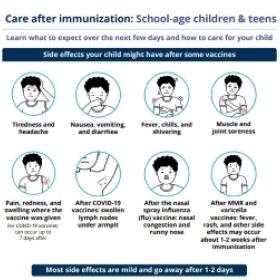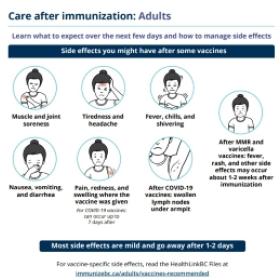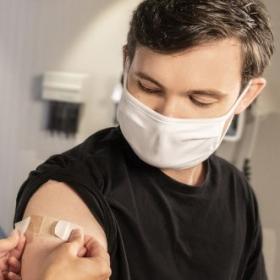Date last reviewed:
Monday, Jun 24, 2024
HealthLinkBC
Available in 简体中文 (Simplified Chinese), Français (French), یسراف (Farsi), 한국어 (Korean), ਪੰਜਾਬੀ (Punjabi), and other languages.

Diseases it protects against
The Tdap vaccine protects against:
-
Diphtheria
-
Tetanus
-
Pertussis (whooping cough)
These diseases can cause serious illness, hospitalization, and even death. Learn more about these diseases.
Fact
Did you know?
Protection from some vaccines decreases with time. The best way to continue to protect your teen and yourself from tetanus, diphtheria, and pertussis is with a booster dose of the Tdap vaccine. This booster dose strengthens or boosts the immune system to better protect against these serious diseases.
Who should get the vaccine
| Age | Schedule |
|---|---|
| School-age children & teens |
|
| Pregnant people |
|
| Adults |
|
People who have had pertussis should still get the vaccine.
Fact
Did you know?
Pregnant people should get the Tdap vaccine in every pregnancy. This helps protect the newborn from pertussis.
How well it works
When people get all the recommended doses, the vaccine protection is:
- Almost 100% for diphtheria and tetanus.
- Around 90% for pertussis. Protection from this vaccine starts to decrease in the years following vaccination. Those who get pertussis after being vaccinated have milder illness.
- Tdap immunization in pregnancy is estimated to provide protection against pertussis in 9 of 10 infants less than 3 months of age.
Protection from these vaccines decreases over time. Booster shots are needed to maintain protection against some of these diseases.
When you or your child get immunized, you help protect others as well. People who are immunized are much less likely to catch a preventable disease and spread it to others.
Safety
Vaccine safety is a top priority in Canada. Every vaccine must be shown to be safe and effective before it is approved for use in Canada. After approval, the safety of vaccines is continuously monitored. Learn more about vaccine safety.
Fact
Vaccines are very safe.
Getting the vaccine is much safer than getting one of the diseases.
Side effects
Many people have no side effects from vaccines. For those that do, they are usually mild and go away on their own within a few days. Serious side effects are very rare.
Common reactions to the Tdap vaccine may include:
- Soreness, redness, and swelling in the arm where the vaccine was given.
The following may also occur:
- Headache, fatigue, muscle or joint soreness, chills, nausea, diarrhea and mild fever.
It is important to stay in the clinic for 15 minutes after getting any vaccine because there is an extremely rare chance of a life-threatening allergic reaction called anaphylaxis. If anaphylaxis happens, you will be given medicine to treat the symptoms.
Let your immunization provider/clinic or health care provider know if you or your child have any serious or unexpected side effects after immunization.
How to manage side effects
For information on how to manage side effects, view the immunization aftercare sheets below.
Who should not get the vaccine
Speak to your health care provider if you or your child:
- Has had a life-threatening reaction to a previous dose of a tetanus, diphtheria, or pertussis vaccine or to any component of the vaccine.
- Developed Guillain-Barré Syndrome (GBS) within 8 weeks of getting a tetanus vaccine, without another cause being identified, as you should not get a tetanus-containing vaccine. GBS is a rare condition that can result in weakness and paralysis of the body's muscles. It most commonly occurs after infections, but in rare cases can also occur after some vaccines.
There is no need to delay getting immunized because of a cold or other mild illness. However, if you have concerns, speak to your health care provider.
Disease quick facts
- Tetanus
-
What is tetanus?
Tetanus is a disease caused by a bacteria that is usually found in dirt and soil. The bacteria make a toxin, or poison, that causes severe muscle spasms. Tetanus can be very dangerous. Tetanus is also called "lockjaw" because muscle spasms in your jaw make it hard to open your mouth.How does tetanus spread?
Tetanus is caused by bacteria usually found in dirt and soil. The bacteria enter the skin through a cut or scrape and produce a poison that causes the painful tightening of the muscles all over the body.Unlike most vaccine-preventable diseases, tetanus does not spread from person to person. Any person not immunized against tetanus is at risk. Immunization is the only way to protect against tetanus.What are the symptoms and risks?
Tetanus symptoms appear slowly and get worse over time. The time it takes for symptoms to appear after a cut or injury ranges from days to months. In most cases, symptoms of tetanus appear within 14 days.Tetanus symptoms often begin with a headache and trouble opening your mouth (lockjaw). You also may have trouble swallowing and/or a stiff neck, back, or shoulders.As the toxin spreads, it can be deadly. It can cause problems with your blood pressure and heart rate. It can cause severe and painful muscle spasms in your neck, arms, legs, and belly.There is no cure for tetanus. Up to 1 in 5 people who get tetanus may die. - Diphtheria
-
What is diphtheria?
Diphtheria is a very serious infection that can affect your nose and throat or skin. It can also spread through the body and damage the heart and central nervous system.Diphtheria is now very rare in Canada because of immunization.How does it spread?
The bacteria are spread through the air by people sneezing or coughing or by direct skin-to-skin contact with someone who has diphtheria.What are the symptoms and risks?
Diphtheria in your nose and throat can cause problems breathing. Symptoms may include:- A moderate to severe sore throat
- Swollen and sore lymph nodes in the neck
- Swelling of the neck
- Heart and nervous system complications
Diphtheria in your skin can cause lesions (damaged skin tissue or sores).Diphtheria can cause severe breathing problems, heart failure and paralysis. One of every 10 people who get diphtheria will die from it. - Pertussis
-
What is pertussis?
Pertussis (also called whooping cough) is a serious infection of the airways caused by pertussis bacteria. People of any age can get pertussis. Infants and young children who have not been immunized get sicker than older children and adults. If an immunized person gets pertussis, they usually have much milder illness.How does it spread?
Pertussis spreads easily when an infected person coughs, sneezes or has close contact with others. Sharing food, drinks or cigarettes, or kissing someone who has the pertussis bacteria can also put you at risk. Pertussis can be spread to others during the early stages of the infection when symptoms are not severe and if left untreated, it can spread up to 3 weeks after the cough starts.What are the symptoms?
Pertussis starts like a common cold with symptoms such as sneezing, runny nose, mild fever and a mild cough.Over the next 2 weeks, the cough worsens, leading to severe, repeated, and forceful coughing spells that often end with a whooping sound before the next breath. The cough can last several months and occurs more often at night. It can make a person gag or spit out mucous, making it hard to breathe. In babies, pertussis can cause periods of apnea in which their breathing is interrupted.Babies under 6 months old, teenagers, and adults may not make the whooping sound. Therefore, anyone who could have been exposed to pertussis and who has a cough that lasts more than 1 week should see a health care provider.What are the risks of the disease?
Pertussis can cause complications such as pneumonia, seizures, brain damage or even death. These complications happen most often in infants under 1 year of age.Each year in Canada, 1 to 3 deaths occur due to pertussis, mostly in babies less than 3 months of age who have not been immunized.






